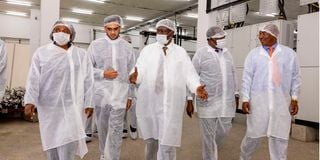Deputy President Rigathi Gachagua orders crackdown on sellers of fake medicines

Deputy President Rigathi Gachagua (centre) during the commissioning of Questa Care, a private pharmaceutical manufacturing company, in Industrial Area, Nairobi.
Deputy President Rigathi Gachagua has called for an intensified crackdown on the manufacture and sale of counterfeit pharmaceuticals in the country.
Speaking when he presided over the official opening of Questa Care pharmaceutical manufacturing company in Nairobi, Mr Gachagua expressed concern over counterfeit drugs and illicit substances being sold in pharmacies. He called for concerted effort to eradicate these harmful products from the market.
“We are witnessing the alarming presence of counterfeit drugs and illicit substances, which are being sold openly in pharmacies. This is a criminal offense, and we must address it urgently. I am calling for a serious operation to root out these counterfeit and hard drugs from pharmacy shops. We cannot allow banned drugs to find their way into chemists and be sold to children. Chemists should not be used as a platform to dispense drugs that have the potential to destroy lives,” he said.
Mr Gachagua further noted that on a global scale, Africa accounts for up to 42 per cent of fake drugs.
“Counterfeits, fake and falsified drugs are a threat to our people. They are a threat to life. They are a threat to livelihoods. Medical drugs are not to kill. Drugs are to improve the quality of life. That is why we are encouraging local production to improve availability and affordability of quality supplies. This is one of the ways of edging out cartels dealing in counterfeits,” said the DP.
A survey conducted by the National Quality Control Laboratories and the Pharmacy and Poisons Board (PPB) in 2018 found that 12 per cent of drugs and medicines in the market are counterfeits. Results of a separate study conducted by the Kenya Association of Pharmaceutical Industry, Pharmaceutical Society of Kenya, Kenya Medical Association and Kenya Association of Manufacturers showed that the figure was higher—up to 30 per cent—with a black market value of up to Sh15 billion.
Mr Gachagua further emphasised that the government has allocated resources to support the PPB and that the security agencies are fully available to assist in the crackdown.
Mr Gachagua said that a multi-agency approach is crucial to complement efforts in both physical and online surveillance.
“Drugs must not kill our people alongside diseases. Already, the disease burden is consuming a lot of resources, impairing development,” he said.
“Surveillance is not an event. It should not happen today because we have raised concerns. It must be a continuous exercise,not only for the Pharmacy and Poisons Board, it is a responsibility for everyone,” he added.
Mr Gachagua also urged PPB to enhance public awareness on verifying the authenticity of drugs through mobile phones. He added that the public should also be well-informed about the process of reporting any suspicions or irregularities related to drugs to the relevant authorities for prompt and effective action.
“While crackdowns are crucial in nabbing dealers of such fake drugs, we ask the security and other involved agencies to put the health of the country first by ensuring that those arrested are severely punished. Officers aiding the syndicate are not part of us. They belong in jail,” said Mr Gachagua.





